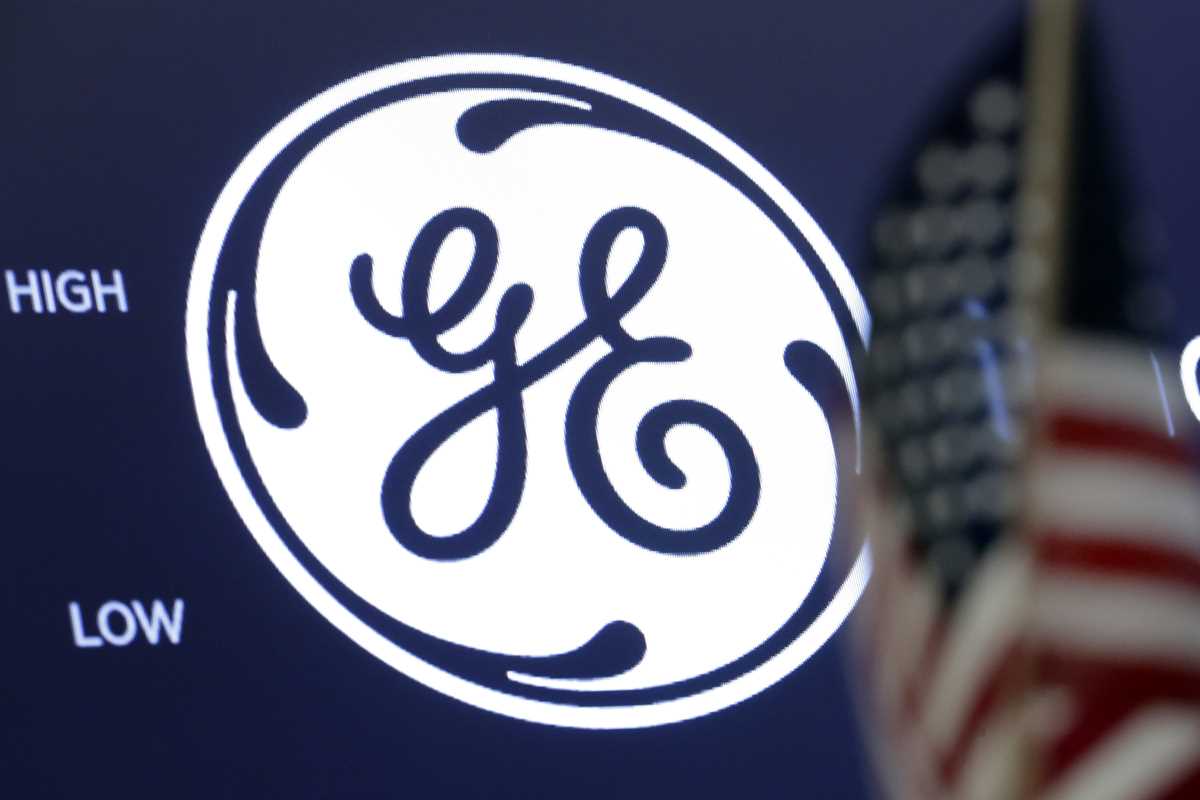 In this June 26, 2018, file photo the General Electric logo appears above a trading post on the floor of the New York Stock Exchange. GE Appliances announced plans Thursday, Oct. 28, 2021, to add more than 1,000 jobs at its sprawling Kentucky operations as part of a $450 million investment to boost capacity and launch new products. (AP Photo/Richard Drew, File)
In this June 26, 2018, file photo the General Electric logo appears above a trading post on the floor of the New York Stock Exchange. GE Appliances announced plans Thursday, Oct. 28, 2021, to add more than 1,000 jobs at its sprawling Kentucky operations as part of a $450 million investment to boost capacity and launch new products. (AP Photo/Richard Drew, File) The General Electric logo appears above a trading post on the floor of the New York Stock Exchange, June 26, 2018. General Electric is splitting itself into three public companies that concentrate on aviation, healthcare and energy. The company said Tuesday, Nov. 9, 2021, that it plans a spinoff of its healthcare business in early 2023 and of its energy segment in early 2024. (AP Photo/Richard Drew, File)
The General Electric logo appears above a trading post on the floor of the New York Stock Exchange, June 26, 2018. General Electric is splitting itself into three public companies that concentrate on aviation, healthcare and energy. The company said Tuesday, Nov. 9, 2021, that it plans a spinoff of its healthcare business in early 2023 and of its energy segment in early 2024. (AP Photo/Richard Drew, File)General Electric, the storied American manufacturer that struggled under its own weight after growing to become a sprawling conglomerate, will divide itself into three public companies focused on aviation, healthcare and energy.
It is the culmination of an arduous, years-long reshaping of a symbol of American manufacturing might that could signal the end of conglomerates as a whole.
“It’s over now," said Nick Heymann of William Blair, who has followed GE for years. "In a digital economy, there’s no real room for it.”
The company has already rid itself of the products most Americans know, including its appliances last year and the light bulbs that GE had been making since the late 19th century when the company was founded.
The announcement Tuesday marks the apogee of those efforts, divvying up an empire created in the 1980s under Jack Welch, one of America's first CEO “superstars.”
GE’s stock became one of the most sought after on Wall Street under Welch, routinely outperforming peers and the broader market. Through the 1990s, it returned 1,120.6% on investments. GE's revenue grew nearly fivefold during Welch’s tenure, and the company's value increased 30-fold.
Yet the stock began to lag in the summer of 2001, the waning days of Welch’s rule, and near ruin for GE struck toward the close of the decade with the arrival of the worst financial crisis since the Great Depression. General Electric's vulnerabilities were laid bare and the epicenter was GE Capital, the company's financial wing.
Shares lost 80% of their value from the start of 2008 into the first few months of 2009 and has only recently begun to recover as the company unwinds much of what Welch built. The stock is already up 30% this year as the asset sales keep coming, and it rose 6% in heavy trading Tuesday, reaching a new high for the year.
GE's aviation unit, it's most profitable, will keep General Electric in the name. GE will spin off its healthcare business in early 2023 and its energy segment including renewable energy, power and digital operations in early 2024.
The decision to split was well received Tuesday by those who had pushed for the change.
“The strategic rationale is clear: three well-capitalized, industry leading public companies, each with deeper operational focus and accountability, greater strategic flexibility and tailored capital allocation decisions, wrote Trian Fund Management, a large stakeholder whose founding partner serves on GE’s board. “We salute GE CEO Larry Culp and his team’s efforts in driving long-term shareholder value.”
Heymann, of William Blair, said the conglomerate model no longer works in a marketplace in which only the quick and agile survive.
Culp will become non-executive chairman of the healthcare company, with GE maintaining a 19.9% stake in the unit. Peter Arduini will serve as president and CEO of GE Healthcare effective January 1, 2022. Scott Strazik will become CEO of the combined renewable energy, power, and digital business. Culp will lead the aviation business along with John Slattery, who will remain its CEO.
Culp achieved a major milestone this year in reshaping General Electric with a $30 billion deal to combine GE's aircraft leasing business with Ireland’s AerCap Holdings. Because the arrangement pushed GE Capital Aviation Services into a separate business, Culp essentially closed the books on GE Capital, the financial division that nearly sank the entire company during the 2008 financial crisis.
The company said Tuesday that it expects operational costs of approximately $2 billion related to the split, which will require board approval.
The Boston company also announced Tuesday that it expects to lower its debt by more than $75 billion by the end of the year.
________________________________________________________________
Business Writer Stan Choe contributed to this report from New York.
Before you consider General Electric, you'll want to hear this.
MarketBeat keeps track of Wall Street's top-rated and best performing research analysts and the stocks they recommend to their clients on a daily basis. MarketBeat has identified the five stocks that top analysts are quietly whispering to their clients to buy now before the broader market catches on... and General Electric wasn't on the list.
While General Electric currently has a "Moderate Buy" rating among analysts, top-rated analysts believe these five stocks are better buys.
View The Five Stocks Here
Click the link below and we'll send you MarketBeat's guide to investing in electric vehicle technologies (EV) and which EV stocks show the most promise.
Get This Free Report